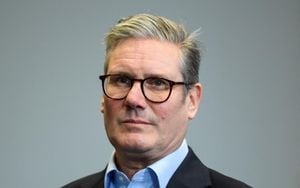On November 17, 2024, central Berlin became the centerpiece for political dissent against the Kremlin as prominent Russian opposition figures led over 1,000 supporters through the city. This demonstration formed part of the broader outcry against President Vladimir Putin’s invasion of Ukraine, spotlighting pleas for democracy within Russia and for peace internationally.
Wielding banners bearing slogans like "No to Putin, No to War," demonstrators gathered near Potsdamer Platz, marching through famed landmarks such as the Brandenburg Gate and Checkpoint Charlie, enlivened by chants of "Russia without Putin" and "Freedom for Political Prisoners!" The rally culminated outside the Russian Embassy.
At the forefront of this protest was Yulia Navalnaya, widow of the late opposition leader Alexei Navalny, whose tragic death sparked renewed urgency among critics of the Russian regime. She was joined by fellow dissidents Ilya Yashin and Vladimir Kara-Murza, who both had spent time imprisoned for their dissent before being released earlier this year as part of a high-profile prisoner exchange.
The organizers estimated up to 2,000 participants at the rally, highlighting unity within the exiled opposition’s ranks, especially significant following internal struggles and conflicting agendas. Chants of "Putin = War" and accusations of his presidency being synonymous with murder were commonplace among the crowd, showcasing the participants' grievances against the regime.
"It is important to demonstrate to the world and to Russians, who may think all Russian speakers align with Putin, the existence of democratic values among us," said protester Polina Zelenskaya, reflecting on the necessity of showing solidarity within the Russian expatriate community.
Despite being encouraged by high attendance, the event also exposed more deep-rooted issues within the movement. Recent years saw the Kremlin implementing relentless oppression against dissent, leaving many opposition factions fractured and struggling under intense pressure, leading to conflicts amid the ranks. Navalny's allies publicly exchanged harsh criticisms, showcasing the tension within the anti-Putin coalition.
This recent protest also revealed the dilemma faced by many opposition figures—how to support Ukraine without alienation from Russian citizens. Ukraine’s ambassador to Germany, Oleksiy Makeev, criticized the protest, denouncing it as lacking dignity and ignoring the needs of his nation, emphasizing the intention to generate clear and impactful change.
Protesters articulated three primary demands: the immediate withdrawal of Russian troops from Ukraine, the trial of Vladimir Putin as a war criminal, and the release of all political prisoners held under dubious circumstances back home. Responding to the tensions within the anti-war camp, Yashin emphasized using the freedom afforded by residing abroad to assert the existence of a peaceful and civilized Russia.
Even amid such dissent, the opposing sentiments were palpable. Some Russian nationals residing abroad expressed hesitance to handle pro-Ukrainian sentiments too ardently, fearing backlash from fellow Russians. Nevertheless, the atmosphere during the Berlin march was charged and united, with participants proud to showcase their opposition against Putin.
The recent protests, which echoed past outcries against the regime, served not only as demonstrations of unity but also as reminders of the fights yet to be won against oppression and warfare. The activists highlighted the essence of the movement: to dispel the misconception of widespread support for war within the Russian populace, showcasing the existence of many striving for change.
Yet, as the event unfolded, the burden of legacy remained heavy. The fall of Navalny marked not just the loss of leadership but generated significant doubts about the future, leaving many within the movement questioning the direction and effectiveness of their protests, especially with the persistent intragroup conflicts. The Berlin rally became not merely about protest but also about solidarity, survival, and the potential for future action against tyranny.
Despite the challenges, these Russian activists left Berlin with renewed determination to amplify their voices beyond the confines of oppression. "This march is just the beginning," Yulia Navalnaya proclaimed, as she beckoned forward her fellow compatriots to continue the struggle against Putin’s regime. The rally was described as both cathartic and galvanizing—a reaffirmation of purpose at a time when unity seemed most needed.



